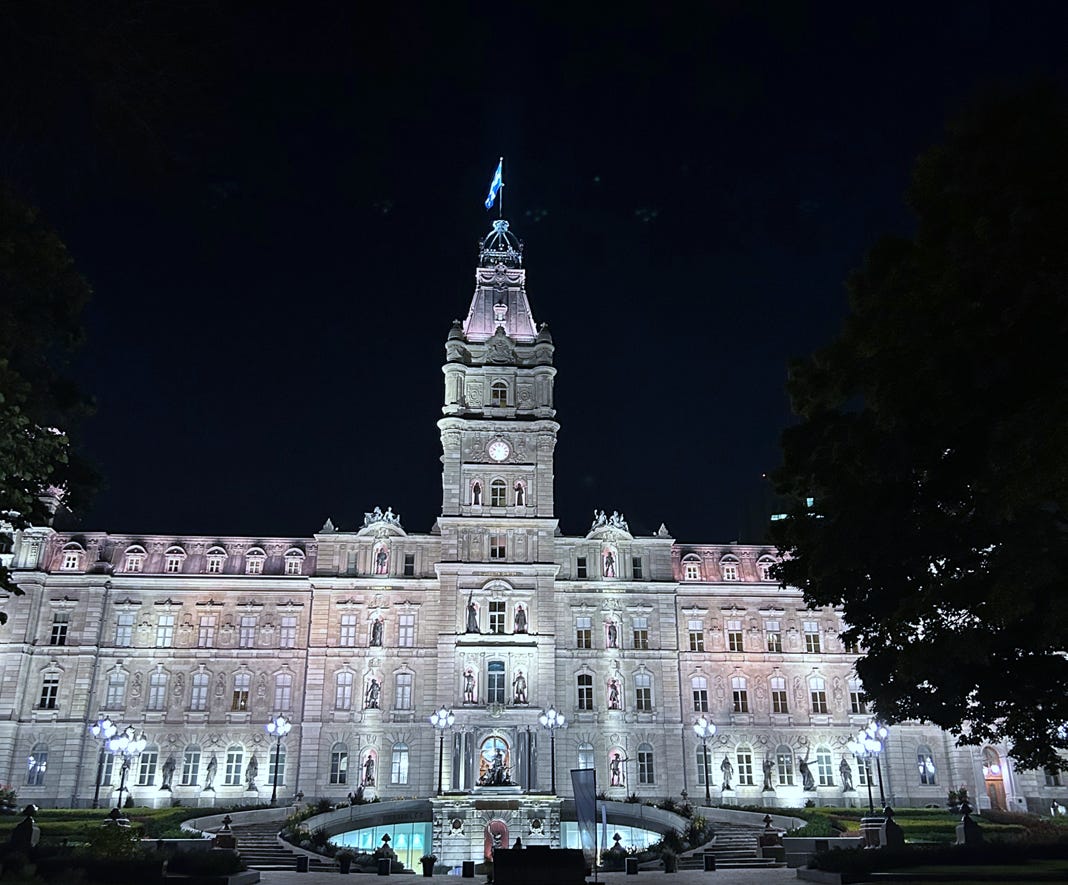338 Quebec Update: François Legault In Deep Trouble
Latest poll from Léger has Legault's CAQ trailing the PQ by 12 points province-wide, and by 17 points among francophone voters
The latest Quebec poll published Wednesday by Léger shows that the Coalition Avenir Québec (CAQ) has been unable to halt its decline of the past months, a direct result of the Parti québécois (PQ) draining the CAQ’s core electorate.
If an election had been held this week, the roles could have been reversed compared to the 2022 vote: the CAQ would have been relegated to third opposition, fighting for official recognition in the National Assembly, while the Parti Québécois would have enjoyed a relatively comfortable majority.
Let’s first get to Léger’s latest numbers, then to the seat projection.
According to this new Léger survey, Paul St-Pierre Plamondon's party has climbed to 34% support among decided voters. This is the best score for the PQ since the Marois era. Better still, the sovereignists are ahead everywhere: In greater Montréal (meaning the PQ is wiping the floor with the CAQ in the 450 suburbs), in Quebec City and in the regions. Read the full Léger report here.
Legault’s CAQ trails the PQ by 12 points, at 22% among decided voters. To add insult to injury, satisfaction with the Legault government sank at 29%, a new low for this government in Léger polls.
Quebec solidaire places third with 18%, which is an interestig results for the left-wing party. There may be no orange wave on the horizon, but QS is holding its own and its support does not appear to be affect by the PQ rise.
The Quebec Liberals get 14%, including a measly 4% among francophones voters. The Conservatives take last place with 10%
By adding this latest Léger survey to the 338Canada Quebec model, the Parti québécois is projected as the favorite in an average of 69 ridings, six more than the threshold for a majority at the National Assembly (for details on the methodology of the seat projection model, see this column).
The PQ would thus rake in the regions that have been so fertile for the CAQ since 2018, and which are also proving to be the most nationalistic: the Laurentians, Montérégie, Saguenay-Lac-Saint-Jean, and it would also take back its former strongholds in the Bas-Saint-Laurent, Gaspésie and Côte-Nord. In addition, as mentioned above, the Capitale-Nationale region would be added to the PQ total.
The Liberal Party (PLQ), still leaderless and at what we believe to be its polling low, wins an average of 26 seats. It thus retains its Montreal strongholds and, thanks to the fall of the CAQ, could make modest gains in Montérégie, Laval and Hull, in the Outaouais region.
Next up is Québec solidaire (QS) with an average of 14 seats, including the Montreal ridings the party already holds, as well as Sherbrooke. The left-wing party could also add Saint-François, in the Eastern Townships, and Rouyn-Noranda-Témiscamingue (where co-spokesperson Émilise Lessard-Therrien plans to run for re-election in 2026) to its caucus. However, with the PQ's stratospheric rise in the Capitale-Nationale, the ridings of Jean-Lesage and Taschereau should be considered pivotal between QS and the PQ.
As for the CAQ, this projection places François Legault's formation at an average of just 11 seats, in fourth place (or third among oppositions). Small consolation for the CAQ team: the confidence interval of the CAQ projection is unusually wide, stretching out to 29 seats.
There are two reasons for this: despite its decline in favor in public opinion, the CAQ still finds itself at the foot of a "sweet spot" (zone payante) where it can win several seats in the projection by improving its national score by a few points. And since the data show that the CAQ and the PQ have significant communicating vessels, if the CAQ were to rise in the polls, this rise would almost certainly be at the PQ's expense. The CAQ isn't finished (far from it!), but it's certainly on the ropes.
Finally, the Quebec Conservative Party (PCQ) remains the favorite in five ridings, four of which are in Chaudière-Appalaches. We'll have to keep an eye on the next polls, however, as this latest Léger survey puts the PCQ at just 13% in the greater Quebec City area, an abnormally low result that considerably lowers its average. Is this simply a negative fluctuation for the PCQ, or the beginning of a trend? After filling up on former CAQ votes, is the Parti Québécois now siphoning off support from the PCQ in Quebec City? The next polls will tell us.
The political landscape in Quebec has taken a serious turn in recent months. The era of CAQ domination will have lasted five years, from 2018 to 2023, and it will be hard to predict how the entangled axes of Quebec politics will realign between now and fall of 2026.
Stay tuned this Sunday for the weekly federal update.
Thank you for reading 338Canada. Please consider subscribing to support our work.
Details of this Quebec projection can be found on the 338Canada Quebec website. For a list of all 125 provincial ridings, visit this page. For a map of the ridings, click here.




